
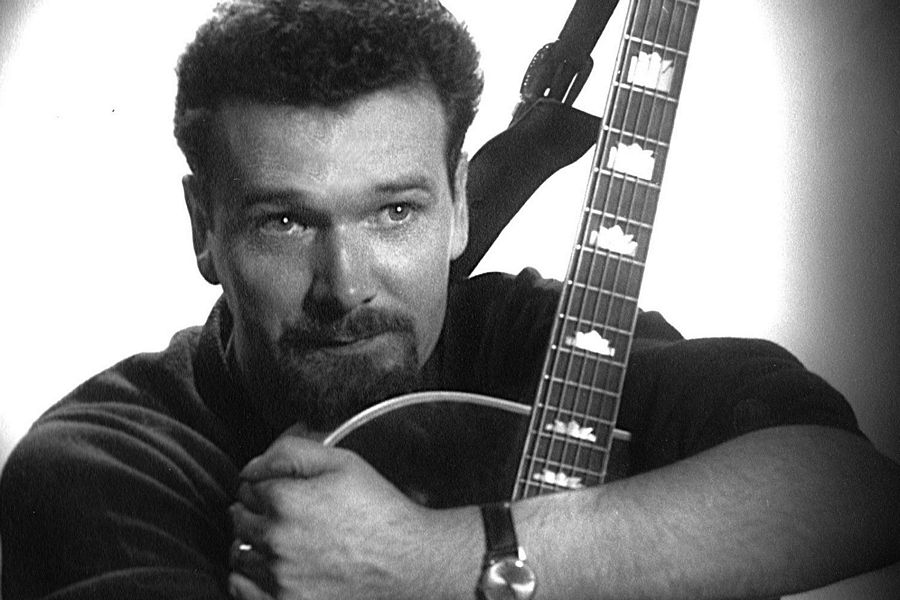
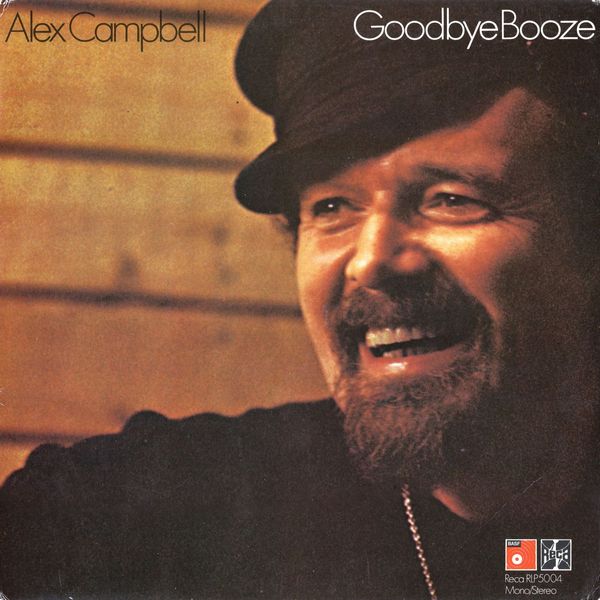 |
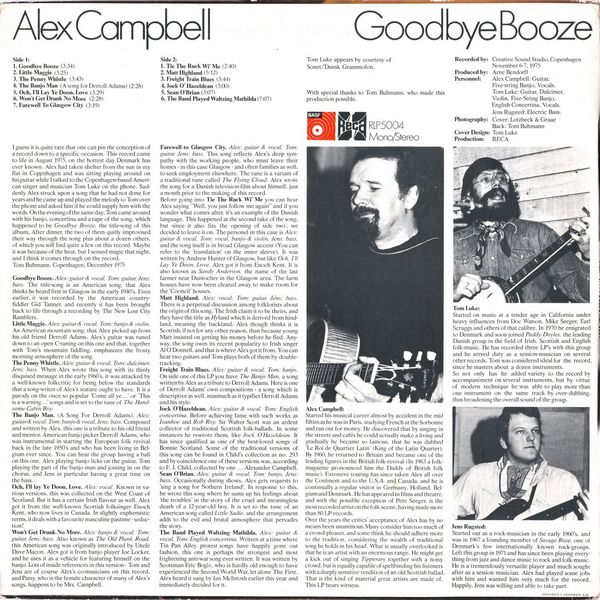
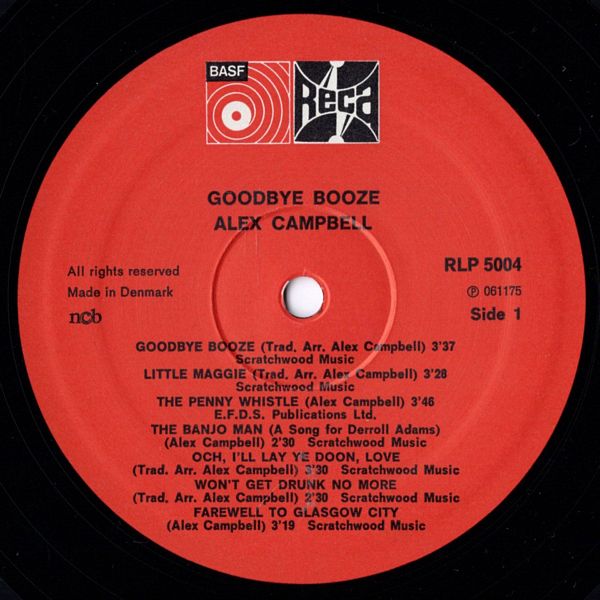
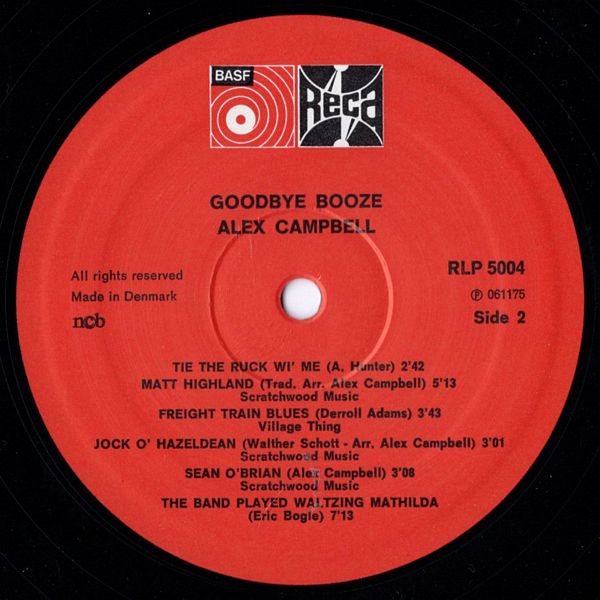
|
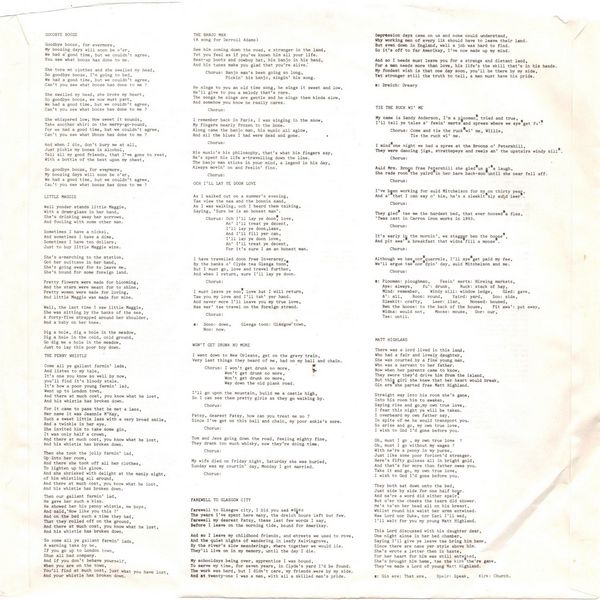
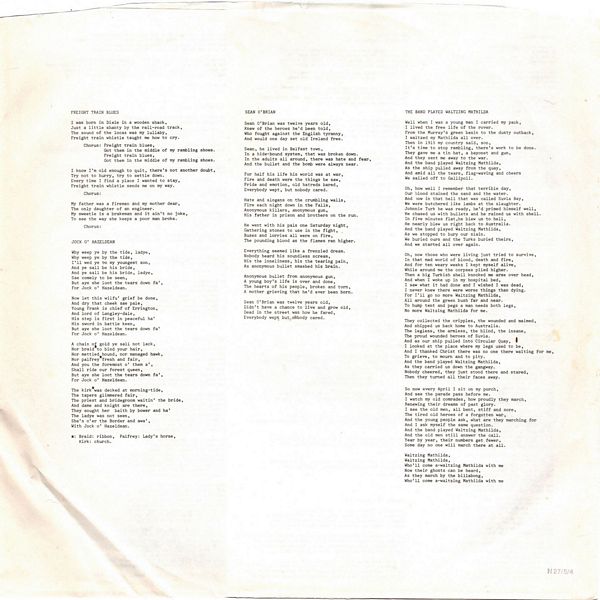
|
Sleeve Notes
I guess it is quite rare that one can pin the conception of a record down to a specific occasion. This record came to life in August 1975, on the hottest day Denmark has ever known. Alex had taken shelter from the sun in my flat in Copenhagen and was sitting playing around on his guitar while I talked to the Copenhagen-based American singer and musician Tom Luke on the phone. Suddenly Alex struck upon a song that he had not done for years and he came up and played the melody to Tom over the phone and asked him if he could supply him with the words. On the evening of the same day, Tom came around with his banjo, concertina and a tape of the song, which happened to be Goodbye Booze, the title-song of this album. After dinner, the two of them quietly improvised their way through the song plus about a dozen others, of which you will find quite a few on this record. Maybe it was because of the heat, but I sensed magic that night, and I think it comes through on the record.
Tom Buhmann. Copenhagen, December 1975
Goodbye Booze — Alex: guitar & vocal, Tom: guitar, Jens: bass. The title-song is an American song, that Alex thinks he heard first in Glasgow in the early 1940's. Even earlier, it was recorded by the American country-fiddler Gid Tanner, and recently it has been brought back to life through a recording by The New Lost City Ramblers.
Little Maggie — Alex: guitar & vocal, Tom: banjo & violin. An American mountain song, that Alex picked up from his old friend Derroll Adams. Alex's guitar was tuned down to an open C-tuning on this one and that, together with Tom's mountain fiddling, emphasizes the frosty morning atmosphere of the song.
The Penny Whistle — Alex: guitar & vocal. Tom: dulcimer. Jens: bass. When Alex wrote this song with its thinly disguised message in the early 1960's, it was attacked by a well-known folkcritic for being below the standards that a song-writer of Alex's stature ought to have. It is a parody on the once so popular "Come all ye …" or This is a warning … ' songs and is set to the tune of The Handsome Cabin Boy.
The Banjo Man (A Song For Derroll Adams) — Alex: guitar & vocal. Tom: banjo & vocal. Jens: bass. Composed and written by Alex, this one is a tribute to his old friend and mentor, American banjo picker Derroll Adams, who was instrumental in starting the European folk revival back in the late 1950's and who has been living in Belgium ever since. You can hear the group having a ball on this one, Alex playing banjo licks on the guitar, Tom playing the part of the banjo man and joining in on the chorus, and Jens in particular having a great time on the bass.
Och, I'll lay Ye Doon, Love — Alex: vocal. Known in various versions, this was collected on the West Coast of Scotland. But it has a certain Irish flavour as well. Alex got it from the well-known Scottish folksinger Enoch Kent, who now lives in Canada. In slightly euphemistic terms, it deals with a favourite masculine pastime — seduction!
Won't Get Drunk No More — Alex: banjo & vocal, Tom: guitar, Jens: bass. Also known as The Old Plank Road, this American song was originally introduced by Uncle Dave Macon. Alex got it from banjo player Joe Locker, and he uses it as a vehicle for featuring himself on the banjo. Lots of inside references in this version — Tom and Jens are of course Alex's co-musicians on this record, and Patsy, who is the female character of many of Alex's songs, happens to be Mrs. Campbell.
Farewell to Glasgow City — Alex: guitar & vocal, Tom: guitar, Jens: bass. This song reflects Alex's deep sympathy with the working people, who must leave their homes — in this case Glasgow — and often families as well, to seek employment elsewhere. The tune is a variant of a traditional tune called The Flying Cloud. Alex wrote the song for a Danish television-film about himself, just a month prior to the making of this record.
Before going into Tie The Ruck Wi' Me you can hear Alex saying "Well, you just follow me again" and if you wonder what comes after, it's an example of the Danish language. This happened at the second take of the song, but since it also fits the opening of side two, we decided to leave it on. The personel in this case is Alex: guitar & vocal, Tom: vocal, banjo & violin, Jens: bass. and the song itself is in broad Glasgow accent (You can refer to the 'translation' on the inner sleeve). It was written by Andrew Hunter of Glasgow, but like Och, I'll Lay Ye Doon, Love. Alex got it from Enoch Kent. It is also known as Sandy Anderson, the name of the last farmer near Duntocher in the Glasgow area. The farmhouses have now been cleared away to make room for the 'Cooncil' houses.
Matt Highland — Alex: vocal, Tom: guitar. Jens: bass. There is a perpetual discussion among folklorists about the origin of this song. The Irish claim it to be theirs, and they have the title as Hyland which is derived from hind-land, meaning the backland. Alex though thinks it is Scottish, if not for any other reason, than because young Matt insisted on getting his money before he fled. Anyway, the song owes its recent popularity to Irish singer Al O'Donnell, and that is where Alex got it from. You can hear two guitars and Tom plays both of them by doubletracking.
Freight Train Blues — Alex: guitar & vocal. Tom: banjo. On side one of this LP you have The Banjo Man. a song written by Alex as a tribute to Derroll Adams. Here is one of Derroll Adams' own compositions — a song which is descriptive as well, inasmuch as it typifies Derroll Adams and his style.
Jock O'Hazeldean — Alex: guitar & vocal. Tom: English concertina. Before achieving fame with such works as Ivanhoe and Rob Roy. Sir Walter Scott was an ardent collector of traditional Scottish folk-ballads. In some instances he rewrote them, like Jock O'Hazeldean. It has since qualified as one of the best-loved songs of Bonnie Scotland. Some of the traditional versions of this song can be found in Child's collection as no. 293 and by coincidence one of these versions was, according to F. J. Child, collected by one … Alexander Campbell.
Seán O'Brian — Alex: guitar & vocal, Tom: banjo, Jens: bass. Occasionally during shows, Alex gets requests to 'sing a song for Northern Ireland'. In response to this, he wrote this song where he sums up his feelings about 'the troubles' in the story of the cruel and meaningless death of a 12-year-old boy. It is set to the tune of an American song called Little Sadie, and the arrangement adds to the evil and brutal atmosphere that pervades the story.
The Band Played Waltzing Mathilda — Alex: guitar & vocal, Tom: English concertina. Written at a time where Tin Pan Alley protest songs have happily gone out fashion, this one is perhaps the strongest and most frightening anti-war song ever written. It was written by Scotsman Eric Bogle, who is hardly old enough to have experienced the Second World War, let alone The First. Alex heard it sung by Ian McIntosh earlier this year and immediately decided for it.
Alex Campbell — Started his musical career almost by accident in the mid-fifties as he was in Paris, studying French at the Sorbonne and ran out for money. He discovered that by singing in the streets and cafes he could actually make a living and gradually he became so famous, that he was dubbed 'Le Roi de Quartier Latin' (King of the Latin Quarter). By 1960, he returned to Britain and became one of the leading figures in the British folk-revival (In 1963 a folk-magazine pronounced him the Daddy of British folk music). Extensive touring has since taken Alex all over the Continent and to the U.S.A. and Canada, and he is continually a regular visitor in Germany, Holland, Belgium and Denmark. He has appeared in films and theatre, and with the possible exception of Pete Seeger, is the most recorded artist on the folk-scene, having made more than 80 LP-records.
Over the years the critics' acceptance of Alex has by no means been unanimous. Many consider him too much of a crowd-pleaser, and some think he should adhere more to the tradition, considering the wealth of traditional song he holds in his head. What is usually overlooked is that he is an artist with an enormous range. He might get a kick out of singing Tipperary together with a noisy crowd, but is equally capable of spellbinding his listeners with a deeply sensitive rendition of an old Scottish ballad. That is the kind of material great artists are made of. This LP bears witness.
Tom Luke — Started on music at a tender age in California under heavy influences from Doc Watson, Mike Seeger, Earl Scruggs and others of that calibre. In 1970 he emigrated to Denmark and soon joined Paddy Doyles, the leading Danish group in the field of Irish, Scottish and English folk-music. He has recorded three LP's with this group and he served duty as a session-musician on several other records. Tom was considered ideal for the record, since he masters about a dozen instruments.
So not only has he added variety to the record by accompaniment on several instruments, but by virtue of modern technique he was able to play more than one instrument on the same track by over-dubbing, thus broadening the overall sound of the group.
Jens Rugsted — Started out as a rock-musician in the early 1960's, and was in 1967 a founding member of Savage Rose, one of Denmark's few internationally known rock-groups. Left this group in 1971 and has since been playing everything from jazz and dance music to rock and folk-music. He is a tremendously versatile player and much sought after as a session musician. Alex had played some jobs with him and wanted him very much for the record. Happily, Jens was willing and able to take part.